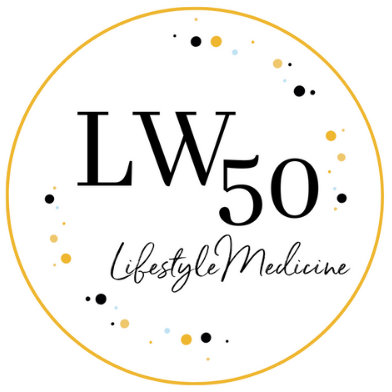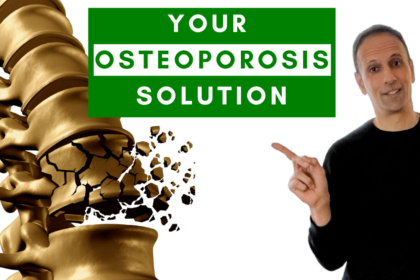At Live Well 50, we believe in healthy living through Lifestyle Medicine. The 4 pillars of lifestyle medicine revolve around nutrition, exercises, restorative sleep, and stress reduction. Prescription medications are used as needed after we have first optimized our lifestyle.
5 Essential Micronutrients for Building Strong Bones
Unless you have had a recent fracture, bone health is one aspect of our health care that tends to get overlooked and neglected. However, osteopenia and osteoporosis (bone softening) are unfortunately very common and affect an estimated 43 million people just in the United States.
Building new bone is a complex process involving nutrition, weight-bearing exercises, impact exercises, and the right amount of micronutrients. Ideally, we are getting all the needed micronutrients for making bone from our diets. However, that’s not always possible for a myriad of reasons. Even if you are doing all the right things to build bone, it can take 8-12 months before results can be seen. In this blog, we will discuss the 5 essential micronutrients needed for building bone. Remember, please discuss any supplement regiment with your physician first.
Calcium
Calcium is one of the main ingredients of bone but we don’t make it on our own. It must come from either our diets or supplements. Calcium is needed for normal cell, muscle, and heart function. If you don’t have enough calcium needed for your essential bodily functions, your body will take it from your bones. This action will weaken your bones over time.
The Para-thyroid gland, located behind your thyroid, helps to regulate the amount of
calcium in your blood. If your blood test reveals higher than normal levels of calcium in
your blood, your physician may test your parathyroid gland for nodules. Ideally, we are getting our calcium from our diets. The daily recommended allowance for calcium is about 1,200 mg/day. I recommend my clients keep a food journal for 3 average days to determine how much calcium they are getting organically from their food. For example, 1 cup of yogurt, milk, or almonds is about 300 mg/calcium. Only supplement if you need to. Too much calcium can contribute to kidney stones and plaque build-up in arteries. There are 2 main types of calcium, carbonate, and citrate. Talk to your physician about which would be better for you.
Vitamin D
There are 2 types of vitamin D. D2, mainly derived from our food, and D3, produced from exposure to the sun. If you live in the Pacific Northwest as I do, we don’t see the sun enough to produce the needed vitamin D. Therefore, supplementation is critical. The I.O.F. (International Osteoporosis Foundation) recommends 800-1000 iu/day.
Get your levels checked and talk to your physician about how much you should be supplementing with.
Protein
Protein is critical for building repairing and building muscle, skin, and bone. Although the range of daily recommended proteins can vary from organization to organization, the European Society of Clinical Nutrition and Metabolism recommends .5 grams per pound of body weight. For example, a 150 lb man would need approximately 75 grams per day.
However, kidney patients need to use caution as an increase in protein consumption can put additional strain on your kidney’s ability to filter out toxins and waste. In addition, if you have a history of kidney stones check with your doctor about the appropriate levels of daily protein intake.
Magnesium
Magnesium is another micronutrient needed for healthy and strong bones. However, even moderate amounts of alcohol (over 1 drink per day) can produce an increased loss of magnesium in your urine. Another factor influencing magnesium levels is the long-term use of PPI (protein pump inhibitor) medication like Prilosec and Nexium. Protein pump inhibitors are commonly prescribed for acid reflux and heartburn. However, the use of these medications can adversely affect the absorption of magnesium in our stomach, leaving us with a lower level of magnesium. You may need to take a 200 mg supplement daily.
Vitamin K
Vitamin K, found in leafy green vegetables, helps to make proteins responsible for bone health and for blood clotting. Although there is not a clear consensus in the literature regarding the efficacy of Vitamin K in regards to building bones and preventing fractures, it has been used in Japan for decades with positive results. However, vitamin K may be contraindicated if you are taking blood thinners (Warfarin and Coumadin are common examples). Once again, please talk to your health provider about any supplements you may be taking or wish to start.
Along with strengthening exercises and balance training, micronutrients are an essential component of building healthy bones.
What to do next
Your 3-step plan for improving your health, loving your life again, and taking charge of your health!
- Schedule your next Physical Therapy visit with Bellingham’s premier Manual Therapy clinic, Integrative Physical Therapy today!
- Join our Facebook group for healthy aging tips, motivation, and a great online community
- Are you over 50 and ready to Love Your Life Again? Let’s do this | Live Well 50
Any questions? We have answers!
Cheers,
Ed Deboo, PT
Integrative Physical Therapy, Bellingham, WA



